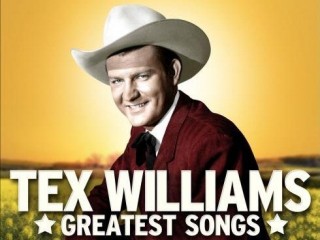
Tex Williams biography
Date of birth : 1917-08-23
Date of death : 1985-10-11
Birthplace : Ramsey, Illinois, U.S.
Nationality : American
Category : Famous Figures
Last modified : 2011-05-02
Credited as : Swing musician, counstry singer-songwriter,
1 votes so far
Like all of the aforementioned musicians, he helped develop country music from its rural, acoustic origins to a more danceable, city-fied, and electrified form with a much wider popular appeal. At his peak in the late '40s, he also recorded some of the most enjoyable country swing of his time, distinguished by his talking-blues vocal delivery. Much of his style can be heard in the Western swing-influenced recordings of revivalists like Asleep at the Wheel, Commander Cody, and Dan Hicks.
The singer and guitarist caught his first big break after moving to Los Angeles in 1942. At that time California was populated by many former Texans and Oklahomans working in the defense industry, creating a need for Western swing entertainment in a region not noted for country music. One of the musicians on this circuit was fiddler Spade Cooley, who employed Jack Williams as his singer, nicknaming him "Tex" to ensure easy identification by the many Texans in their audiences. Several of Cooley's mid-'40s Columbia singles featured Tex on vocals.
Capitol offered a contract to Williams as a solo artist, which strained the relationship between Tex and the tempestuous Cooley to the breaking point. Cooley fired Williams in June 1946, a move which backfired badly, as most of Cooley's band opted to follow Tex rather than remain with their difficult boss. Cooley achieved his greatest subsequent notoriety when he was convicted of beating his wife to death in a drunken fit in 1961.
Tex's renamed backing band, the Western Caravan, was one of the best units of its kind. Numbering about a dozen members, it attained an enviable level of fluid interplay between electric and steel guitars, fiddles, bass, accordion, trumpet, and other instruments (even occasional harp). At first they recorded polkas for Capitol, with limited success. They found their true calling when Williams' friend Merle Travis wrote most of "Smoke! Smoke! Smoke! (That Cigarette)" for him, emphasizing Tex's talking-blues delivery and heavier boogie elements. The song was a monstrous commercial success in 1947, and indeed one of the biggest country hits of all time, making number one on the pop charts.
That set the model for several of Williams' subsequent hits: hot Western swing backup, over which Tex would roll his deep, laconic, easygoing narratives of humorous, slightly ridiculous situations. As enjoyable as these were, they were just one facet of the Western Caravan's talents. The outfit was also capable of generating quite a heat on boogie instrumentals and more straightforward vocal numbers in which Williams actually sang rather than spoke.
Williams' commercial success began to peter out in the early '50s, and he left Capitol in 1951. He continued to record often in the 1950s, mostly for Decca, without much success; in 1957, the Western Caravan disbanded. He pressed on, however, returning to Capitol in the early '60s, and recording a live album that included Glen Campbell on guitar. He had one final country hit, the memorably titled "The Night Miss Ann's Hotel for Single Girls Burned Down," which entered the Top 40 in 1971.

















